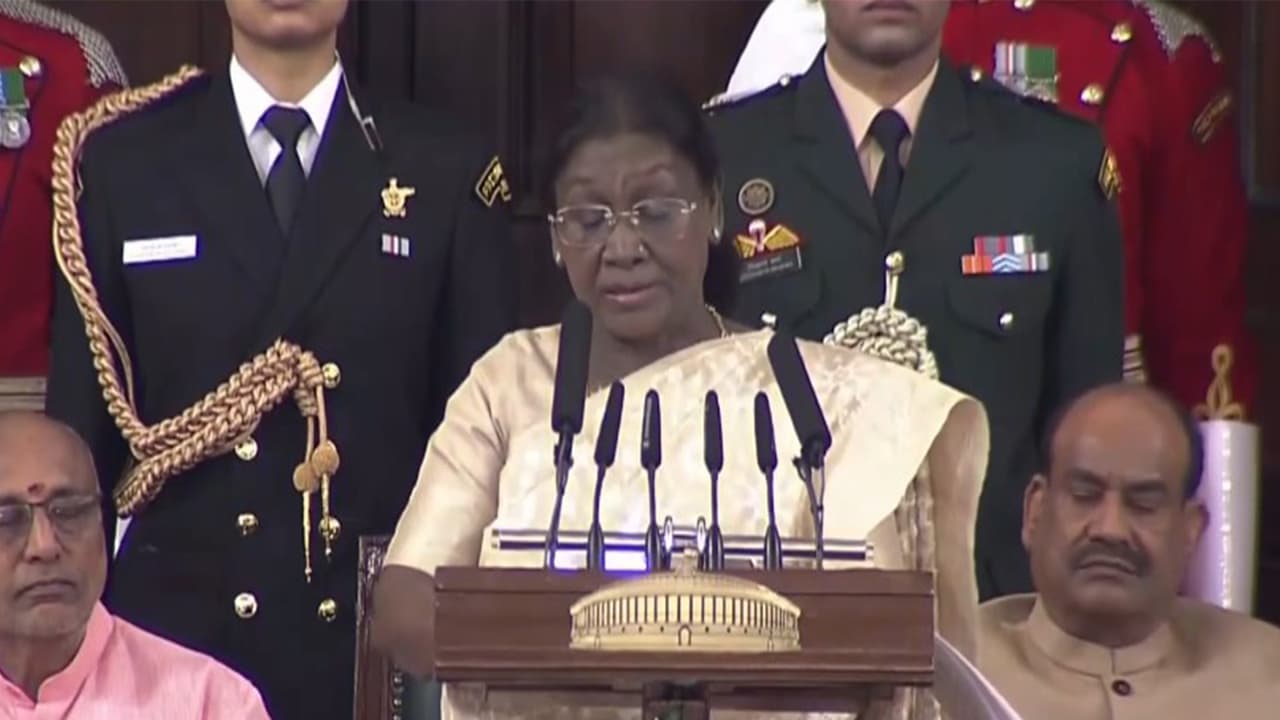President Droupadi Murmu congratulated MPs on Constitution Day, hailing the framers’ vision. She praised Dr. Ambedkar and highlighted key reforms like the GST, repeal of Article 370, and the Nari Shakti Bandhan Act (Women’s Reservation Bill).
President Droupadi Murmu on Wednesday expressed happiness and congratulated the members of Parliament for upholding the vision and dreams of the original Constitutional framers on the occasion of Constitution Day. “Additionally, I bow in respect at this commemoration for good luck and prosperity to the members,” President Murmu said.
Recalling the history of the making of the constitution, she remembered Dr Babasaheb Ambedkar, who was chairman of the Drafting Committee and praised his efforts in drafting India’s supreme legal document. “I am delighted to be among you all on the historic occasion of Constitution Day. On this very day, November 26, 1949, in this very Central Hall of the Constitution House, the members of the Constituent Assembly completed the task of drafting the Constitution of India. On this very day that year, we, the people of India, adopted our Constitution. After independence, the Constituent Assembly also served as India’s interim Parliament. Baba Saheb Dr Bhimrao Ambedkar, Chairman of the Drafting Committee, was one of the principal architects of our Constitution,” she said.
Murmu Highlights Landmark Reforms
Praising the curbng of social evils by taking historic steps such as banning triple talaq, and empowering sisters and daughters, President Murmu also highlighted the GST reform, repeal of Article 370, the Nari Shakti Bandhan Act (Women’s Reservation Bill) and other examples of ushering in a new era of development, especially for women. “By curbing the social evil associated with triple talaq, Parliament took historic steps toward the empowerment and social justice of our sisters and daughters. The Goods and Services Tax, the biggest tax reform since independence, was implemented to promote the country’s economic integration. The repeal of Article 370 removed a barrier to the country’s overall political integration. The Nari Shakti Bandhan Act will usher in a new era of women-led development,” President Murmu said.
Commemoration and Constitutional Ideals
This year, starting November 7 a nationwide commemoration is being held to mark the completion of 150 years of the composition of our national anthem, Vande Mataram, the President added.
She further highlighted how the soul of the constitution is expressed through the ideals of political justice, freedom and similar ideals. After her speech, President Murmu led the MPs at the event in reading the Preamble of the Constitution, and released the translated version of the Constitution in nine languages- Malayalam, Marathi, Nepali, Punjabi, Bodo, Kashmiri, Telugu, Odia and Assamese.
About the Constitution of India
The Constitution of India was adopted on November 26, 1949, and came into effect a few months later, on January 26, 1950.
The document was extensively debated and agreed upon by the Constituent Assembly.
The document established India as a Sovereign, Democratic Republic with the aim of securing all citizens Justice, Liberty, Equality, and Fraternity.
It is the longest written Constitution in the world, demarcating the separation of powers, structure of administration, courts and legislative departments for the country.
The Constitution calls for adhering to constitutional supremacy. (ANI)
(Except for the headline, this story has not been edited by Asianet Newsable English staff and is published from a syndicated feed.)
